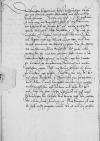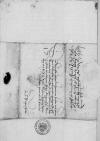Letter #5284
Ioannes DANTISCUS to Albrecht I von Hohenzollern-AnsbachHeilsberg (Lidzbark), 1542-07-14
Manuscript sources:
Auxiliary sources:
Prints:
| ||||||||||
Text & apparatus & commentary Plain text Text & commentary Text & apparatus
 GStA PK, HBA, C1 No 846, 3 unnumbered
GStA PK, HBA, C1 No 846, 3 unnumbered
Dem durchlauchtigen, hochgebornen fursten und herren, hern
In
 GStA PK, HBA, C1 No 846, 1 unnumbered
GStA PK, HBA, C1 No 846, 1 unnumbered
Durchlauchter, hochgeborner furst, hochgunstiger, lieber her und freundt. / Unsere freuntliche und vleis willige dinste zuvoran. /
Wie wir negst E(wer) F(urstlichen) D(urchlauch)t cf.
Aus  GStA PK, HBA, C1 No 846, 2 unnumbered kommen, / das der
GStA PK, HBA, C1 No 846, 2 unnumbered kommen, / das der
Dis alles hab wir E(wer) F(urstlichen) D(urchlauch)t in der eyll mit den ersten unangezeigt nicht wollen lassen / domit, / so die villeicht umb herbergen, / wie wir bericht, jemants het zuvor ausgeschickt / von wegen solche ehefreud zubesuchen, / das die dieses vorzogs wissenschaft hette, / welchs wir derselben E(wer) F(urstlichen) D(urchlauch)t, / in der gunst wir uns freuntlich bevelhen, / wilferiger weis nicht haben mugen bergen. /
Dat(um)
Io(an)nes ep(iscopu)s Varmien(sis) ma(n)u p(ro)pria s(ub)scripsi


